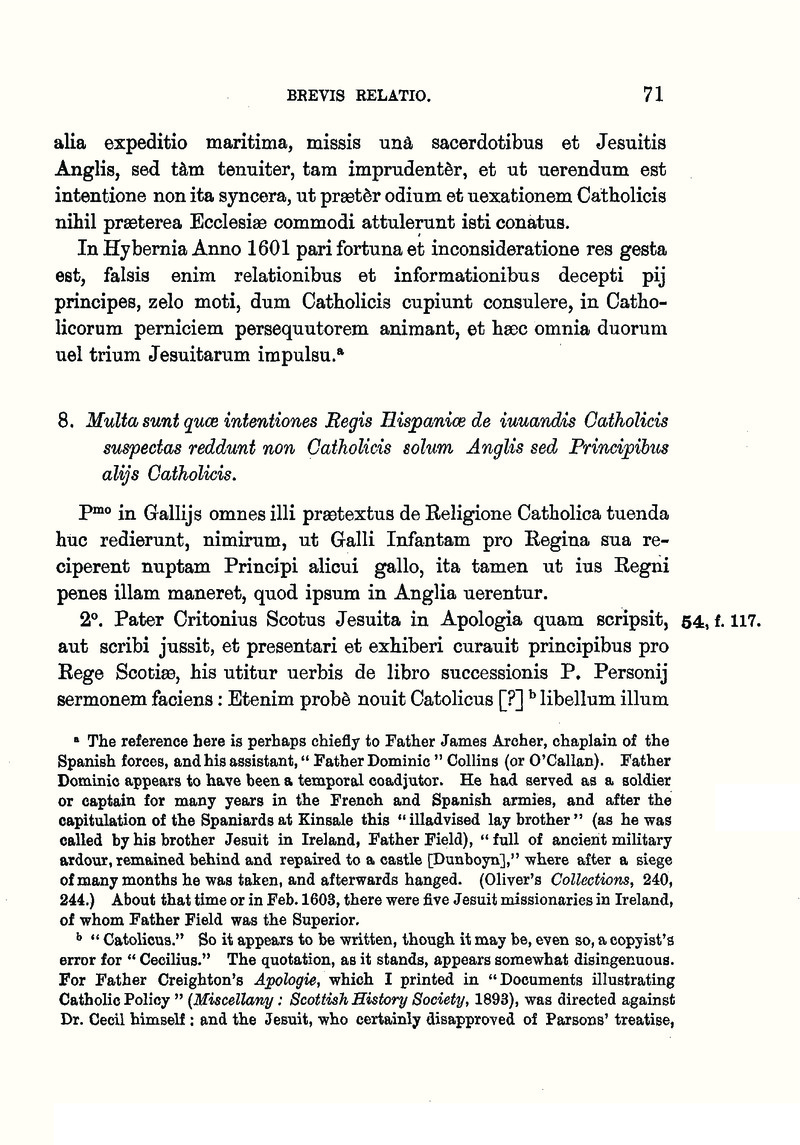No CrossRef data available.
Published online by Cambridge University Press: 24 December 2009

Page 71 note a The reference here is perhaps chiefly to Father James Archer, chaplain of the Spanish forces, and his assistant, “Father Dominic” Collins (or O'Callan). Father Dominic appears to have been a temporal coadjutor. He had served as a soldier or captain for many years in the French and Spanish armies, and after the capitulation of the Spaniards at Kinsale this “illadvised lay brother” (as he was called by his brother Jesuit in Ireland, Father Field), “full of ancient military ardour, remained behind and repaired to a castle [Dunboyn],” where after a siege of many months he was taken, and afterwards hanged. (Oliver's Collections, 240, 244.) About that time or in Feb. 1603, there were five Jesuit missionaries in Ireland, of whom Father Field was the Superior.
Page 71 note b “Catolicus.” So it appears to be written, though it may be, even so, a copyist's error for “Cecilius.” The quotation, as it stands, appears somewhat disingenuous. For Father Creighton's Apologie, which I printed in “Documents illustrating Catholic Policy” (Miscellany : Scottish History Society, 1893), was directed against Dr. Cecil himself: and the Jesuit, who certainly disapproved of Parsons' treatise, here accuses Cecil of having dishonestly defended it. Cecil had, in fact, drawn up a Memorial for the King of Spain in 1596, to show that King James was always a bitter enemy of Catholics, and that any recent pretensions of his to the contrary were dictated by, a fear of the,, influence of the Book of Succession. “The King of Scotland,” wrote Cecil, “hath come to know that this book hath made a great impression on all sorts of people,” etc. Creighton remarked bitterly, “This honest man M. C. in the end of his discourse doth much commend Mr. Doleman his booke of the succession to the crowne of England, saying that it hath made such impression in the hearts of all sorts of men that the K. of Sootland thereby hath been moved to seeke to the Pope for his conversion, and the K. of Spayne for a league to assure his partie in tyme: but here M. C. cunningly… as he hath begonne and proceaded continually wth malitious lyes so he doth end, for he [Cecil] knoweth well that Mr. Doleman's booke hath made an impression in the hearts of Englishmen that the K. of Spayne doth more affect the kingdome of England then the conversion of the people to the Catholiq faith, as they beleeved befor.”
Dr. Cecil's former intrigues with the Spanish party were probably as insincere as they were mercenary, and his later alliance with the Appellants appears to have been the result of a genuine conversion. His conversion, however, was very recent. Nov. 26, 1601, not three months before Cecil's arrival in Borne on his present mission, Cardinal d'Ossat wrote to Villeroi warning him against certain Scots and English then in France who were acting as spies on behalf of Spain, and naming among others Robert Bruce, “fort mauvais homme,” and an English priest John Cecil, “nommé le Docteur Cecill, comme il est aussi Docteur passé à Cahors, âgé de quarante ans, duquel on sçaura nouvelles au Collège des Mignons. II a été en Espagne & fait le mal-content des Espagnols, & néanmoins écrit à Rome au Père Personius, Jésuite, Anglois de nation & Esgagnol de dévotion.” Lettre cce. (Vol. 5, p. 58.)